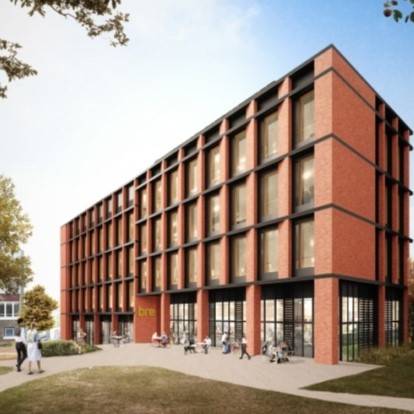September 5, 2018
From FUBAR to Five Star: Delivering Excellent Facilities Management 0
 Mark Wilcock is an experienced facilities management professional and he has something to share with you. His self-written new book From FUBAR to Five Star: Delivering Excellent Facilities Management offers reflections and guidance on a range of challenges that face facilities managers in their day to day lives. Mark is currently Business Support and Planning Manager at The Co-operative Group based in Manchester and was one of the first three thousand members of the BIFM. He has around 25 years experience in facilities management across a number of sectors and in different countries. In the book he shares his thoughts on key issues related to both the day to day and strategic role of facilities managers. All proceeds from the book will be donated to Alzheimer’s Research. Image: Co-op One Angel Square office Manchester, Buro Happold/David Hopkinson
Mark Wilcock is an experienced facilities management professional and he has something to share with you. His self-written new book From FUBAR to Five Star: Delivering Excellent Facilities Management offers reflections and guidance on a range of challenges that face facilities managers in their day to day lives. Mark is currently Business Support and Planning Manager at The Co-operative Group based in Manchester and was one of the first three thousand members of the BIFM. He has around 25 years experience in facilities management across a number of sectors and in different countries. In the book he shares his thoughts on key issues related to both the day to day and strategic role of facilities managers. All proceeds from the book will be donated to Alzheimer’s Research. Image: Co-op One Angel Square office Manchester, Buro Happold/David Hopkinson









 The quality of the coffee is the most important feature for office occupants, with two thirds of workers saying a decent flat white or cappuccino is an essential for a productive and engaged workforce. Research by coworking developer Areaworks also found that being closer to the outdoors, and the ability to work from a balcony or roof terrace was an important factor for 64 percent. Hanging chairs, bean bags and flexible spaces are a must for most, as half of office workers want to ditch fixed desks in favour of casual seating and hot desking, making it a top five most favoured feature. the office gimmicks failed to feature on most people’s workplace bucket list. The installation of office gimmicks such as fireman’s poles and ball pits all failed to feature on most people’s workplace list, but slides did make the list, while the majority (66 percent) included a fridge complete with beer and prosecco among their choice items.
The quality of the coffee is the most important feature for office occupants, with two thirds of workers saying a decent flat white or cappuccino is an essential for a productive and engaged workforce. Research by coworking developer Areaworks also found that being closer to the outdoors, and the ability to work from a balcony or roof terrace was an important factor for 64 percent. Hanging chairs, bean bags and flexible spaces are a must for most, as half of office workers want to ditch fixed desks in favour of casual seating and hot desking, making it a top five most favoured feature. the office gimmicks failed to feature on most people’s workplace bucket list. The installation of office gimmicks such as fireman’s poles and ball pits all failed to feature on most people’s workplace list, but slides did make the list, while the majority (66 percent) included a fridge complete with beer and prosecco among their choice items.







 The latest generation of workplace recruits, the so-called Gen Z graduates, are more likely to stay in their first role if flexible working and mentoring is on offer, new research claims. According to graduate jobs board Milkround, while over half (55 percent) of new graduates’ plan to stay in their first role for less than two years, 76 percent can be encouraged to stay longer with training/mentorship and 63 percent with flexible hours. They are also ambitious and have high expectations, with 65 percent believing they will work in their dream industry. This impacts what is expected of employers and could hold the key to encouraging this new generation to stay in roles longer. This change in expectations begins before they start their new role – 68 percent of graduates are calling for more detailed job descriptions and 57 percent would like to have an open line of communication with their line manager from the moment they accept a job.
The latest generation of workplace recruits, the so-called Gen Z graduates, are more likely to stay in their first role if flexible working and mentoring is on offer, new research claims. According to graduate jobs board Milkround, while over half (55 percent) of new graduates’ plan to stay in their first role for less than two years, 76 percent can be encouraged to stay longer with training/mentorship and 63 percent with flexible hours. They are also ambitious and have high expectations, with 65 percent believing they will work in their dream industry. This impacts what is expected of employers and could hold the key to encouraging this new generation to stay in roles longer. This change in expectations begins before they start their new role – 68 percent of graduates are calling for more detailed job descriptions and 57 percent would like to have an open line of communication with their line manager from the moment they accept a job.
 We reported
We reported 
 Young people leaving education and looking for work may be missing out on potential employment opportunities by failing to consider Small and Medium Enterprises (SMEs) and the advantages they offer, new research from Santander UK claims. ‘Gen Z’ and Millennials do not believe SMEs offer the same job security or salary as large businesses, meaning just a third (35 percent) of young people leaving education in 2018 want to work for smaller employer, and an even smaller proportion, just one in six (18 percent), want to work for a start-up or micro business. The most popular career aspirations for Generation Z and Millennials are to work for a large firm (51 percent), the public sector (51 percent) or a global multinational (49 percent), because of a perceived lack of job security (56 percent). There is also the belief that SMEs offer a lower salary (46 percent) and fewer opportunities for progression than large companies (33 percent). Yet the majority (70 percent) of SMEs are actively recruiting for entry level roles, whether that be graduates (43 percent), further education leavers (36 percent) or school leavers (35 percent).
Young people leaving education and looking for work may be missing out on potential employment opportunities by failing to consider Small and Medium Enterprises (SMEs) and the advantages they offer, new research from Santander UK claims. ‘Gen Z’ and Millennials do not believe SMEs offer the same job security or salary as large businesses, meaning just a third (35 percent) of young people leaving education in 2018 want to work for smaller employer, and an even smaller proportion, just one in six (18 percent), want to work for a start-up or micro business. The most popular career aspirations for Generation Z and Millennials are to work for a large firm (51 percent), the public sector (51 percent) or a global multinational (49 percent), because of a perceived lack of job security (56 percent). There is also the belief that SMEs offer a lower salary (46 percent) and fewer opportunities for progression than large companies (33 percent). Yet the majority (70 percent) of SMEs are actively recruiting for entry level roles, whether that be graduates (43 percent), further education leavers (36 percent) or school leavers (35 percent).
 London has joined 18 other cities around the world, including Paris, New York and Tokyo, in a landmark commitment to make all new buildings operate at net zero carbon by 2030. Regulations and planning policy will also target existing buildings to make them net-zero carbon by 2050. Net zero carbon buildings are buildings which reduce all energy use as far as technically possible, with remaining demand met through renewables. The commitment has been orchestrated by C40 cities, a global group of major cities committed to delivering on the most ambitious goals of the Paris Agreement at the local level. As city authorities do not have direct control over all the buildings in their area, the commitment includes a pledge to work together with the private sector as well as state and regional governments to drive the transformation. This pledge from cities is part of the World Green Building Council’s
London has joined 18 other cities around the world, including Paris, New York and Tokyo, in a landmark commitment to make all new buildings operate at net zero carbon by 2030. Regulations and planning policy will also target existing buildings to make them net-zero carbon by 2050. Net zero carbon buildings are buildings which reduce all energy use as far as technically possible, with remaining demand met through renewables. The commitment has been orchestrated by C40 cities, a global group of major cities committed to delivering on the most ambitious goals of the Paris Agreement at the local level. As city authorities do not have direct control over all the buildings in their area, the commitment includes a pledge to work together with the private sector as well as state and regional governments to drive the transformation. This pledge from cities is part of the World Green Building Council’s 







